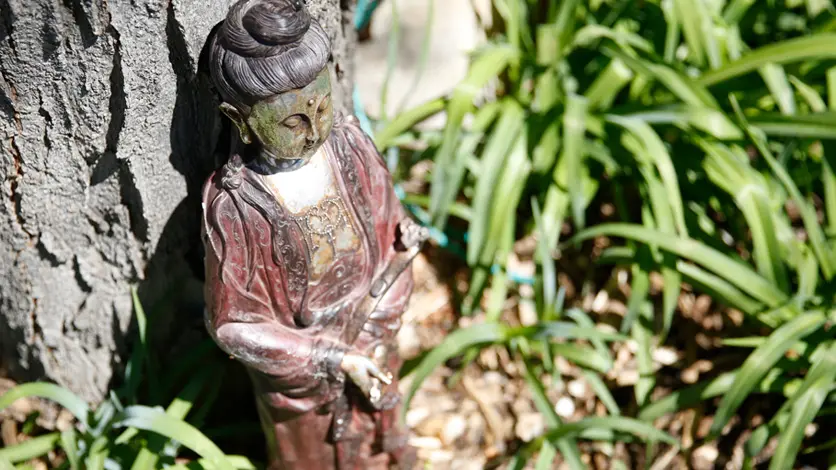Master of Arts in Clinical Mental Health Counseling Concentration
Buddhism-Informed Contemplative Counseling
Develop deep insights and connections rooted in Buddhist wisdom and humanistic frameworks of the Global North and achieve a degree in Clinical Mental Health Counseling with a concentration in Buddhism-Informed Contemplative Counseling, offered by the only Buddhist-inspired accredited institution in the US.
About this Concentration
The concentration of Buddhism-informed Contemplative Counseling is rooted in the rich 2,500-year-old Buddhist wisdom tradition and enriched by the clinical insights of Clinical Mental Health Counseling.
In this strongly Buddhism-informed counseling concentration, you will nurture self-awareness and clinical discernment through meditation practices and retreats and receive the guidance of an experienced team to uncover your innate compassion for self and others as it applies to clinical work in individual and group settings.
The first year is an introduction to the main themes of the counselor identity. In addition to basic counseling skills, classes and teachings emphasize getting to know your mind through meditation and other experiential practices. Further semesters integrate meditation and other contemplative practices with more advanced clinical skills embedded in the view of counselor as bodhisattva. The final year includes contemplative supervision of internship clinical work, mandala principle, and the teachings on the bardo—the time between death and rebirth- symbolizing the culmination of your Naropa experience.
Maitri Retreats
Maitri means unconditional friendliness. One and two-week-long residential Maitri retreats combine intensive meditation instruction and practices, talks, walking meditation, some days of silence, and community work practice. Maitri space awareness practice which is introduced in the second semester fosters compassion for self and others, leading to relaxation and fearlessness in interactions.
Clinical Internships
In your third year, you’ll benefit from on-site supervision in a specialized field at your clinical placement and receive contemplative faculty supervision in the program. This clinical internship prepares you for counseling roles across diverse settings.
Meditation Focus
The master’s program in Clinical Mental Health Counseling, with a concentration in Buddhism-Informed Contemplative Counseling, emphasizes meditation, enabling you to deeply understand and navigate your psychological and emotional states with heightened clarity and sensitivity. These skills then support your capacity for discernment and skillful action in relationship with clients.
Quick Facts
- On-campus degree
- The Only fully Clinical Mental Health Counseling program offered by a Buddhist-inspired accredited institution.
- 65 credit hours
- 700 hours of Clinical Internship Experience.
- 9 weeks of Intensive Community Maitri Retreat Practice.
- Highly experienced faculty and staff with ongoing clinical and contemplative practice.
- Meditation, Self-Awareness, Compassion, and SkillFocus.
- Now Accepting Applications for August 2024
Program Format
The Buddhism-informed Contemplative Counseling concentration of the MA in Clinical Mental Health Counseling program is a unique, on-campus, three-year program integrating traditions from clinical counseling and psychology with the contemplative wisdom of Buddhism.
A key aspect of the concentration is the five Maitri meditation retreats. Each retreat has a different focus, beginning with a strong emphasis on sitting meditation, and gradually incorporating practices designed to cultivate relational awareness, compassion, and emotional intelligence and their application to the counseling relationship.
The concentration prepares students for a clinical counseling career and meets Colorado’s educational requirements for licensure as a professional counselor. The semester-long practicum and the year-long supervised internship provide essential clinical experience.

Course Spotlight
Buddhist Foundations for Counseling I: Contemplative Views and Practices
Buddhist Foundations for Counseling I delves into Brilliant Sanity or Buddha Nature, emphasizing intrinsic health. The course explores Buddhist psychology, addressing clarity versus confusion in the mind. A central theme is the misconception of a solid self as a source of suffering. Emphasis is placed on understanding impermanence and its implications for behavior. Meditation is introduced as a tool for self-awareness, forming the basis for ethical counseling practices.
Degree
Requirements
The Buddhism-Informed Contemplative Counseling concentration of the MA in Clinical Mental Health Counseling program is a 65-credit clinical training program blending insights from clinical counseling and psychology with the contemplative teachings of Buddhism.
Buddhism-Informed Contemplative Counseling Degree Requirements
Semester 1, Fall Year 1(12.5 credits)
- CNSC 600, Opening Retreat (0)
- CMHC 600, Foundations and Orientation of Clinical Mental Health Counseling (3)
- CNSC 728, Community Dynamics Awareness Lab I (0.5)
- CMHC 610, Career Development (3)
- CNSC 603, Buddhist Foundations for Counseling I: Contemplative Views and Practices (2)
- CNSC 660, Maitri I (1)
- CMHC 602, Human Growth and Development (3)
Semester 2, Spring Year 1 (12.5 credits)
- CNSC 609, Interpersonal Dynamics Awareness Lab I (0.5)
- CMHC 603, Counseling & Helping Relationships I (3)
- CMHC 601, Social/Multicultural Foundations (3)
- CNSC 623, Buddhist Foundations for Counseling II: Abhidharma (2)
- CNSC 665, Maitri II (1)
- CMHC 606, Legal and Ethical Aspects of Counseling (3)
Summer Year 1 (off, 0 credits)
Semester 3 all Year 2 (13 credits)
- CNSC 629, Interpersonal Dynamics Awareness Lab II (0.5)
- CNSC 828, Community Dynamics Awareness Lab II (0.5)
- CMHC 604, Counseling & Helping Relationships II (3)
- CMHC 605, Group Counseling (3)
- CNSC 703, Buddhist Foundations for Counseling III: Mahayana/Heart of Emptiness (2)
- CNSC 760, Maitri III (1)
Semester 4, Spring Year 2 (9.5 credits)
- CNSC 709, Interpersonal Dynamics Awareness Lab III (0.5)
- CMHC 620, Counseling Practicum (3)
- CMHC 607, Diagnosis and Treatment Planning (3)
- CNSC 723, Buddhist Foundations for Counseling IV: Counselors as Bodhisattvas (2)
- CNSC 765, Maitri IV (1)
Semester 5, Summer Year 2 (8 credits)
- CMHC 609, Research & Program Evaluation (3)
- CMHC 608, Assessment (3)
- CMHC 621, Initial Internship (2)
Semester 6, Fall Year 3 (6.5 credits)
- CNSC 729, Interpersonal Awareness Dynamics Lab IV (0.5)
- CMHC 622, Internship I (3)
- CMHC 615, Capstone I (1)
- CNSC 803, Buddhist Foundations for Counseling V: Glimpses of Vajrayana (2)
Winter Intersession (0 credits)
- CMHC 623, Winter Intersession Internship (0)
Semester 7, Spring Year 3 (6 credits)
- CNSC 809, Interpersonal Awareness Dynamics Lab V (0.5)
- CMHC 624, Internship II (3)
- CMHC 616, Capstone II (1)
- CNSC 860, Maitri V (0.5)
- CNSC 890, Special Topics in Buddhist-Informed Counseling (1)
Why Choose Naropa?
Contemplative Education
As the pioneer of the modern mindfulness movement, Naropa enhances students' education through meditation and introspective exercises, seamlessly blending contemplative insights with traditional academic studies in every program.
Diversity & Inclusion
Our dedication to diversity is part of our core mission embedded in contemplative learning and exploration. This approach aims to embrace human qualities that foster collaboration among diverse perspectives, paving the way for an interconnected and equitable society.
Hands-On Learning
Naropa students pursuing a master's degree in counseling dedicate 700-900 hours to practical, clinical experiences. During these clinical experiences, students receive consistent guidance from peers and faculty, combining clinical oversight with mindfulness and awareness techniques within the contemplative education framework.

How this Program Prepares You
Clinical Training Program
The Buddhism-informed Contemplative Counseling concentration equips students for the clinical field through a nine-month internship in their third year. Students receive comprehensive training in clinical skills and theory in both individual and group counseling methods. The internship offers valuable experience in specialized areas, enhancing their readiness for professional practice.
Community Connection
Navigating the program with peers allows students to refine interpersonal skills and offer mutual support over three years, fostering both camaraderie and occasional challenges due to familiarity. Through community and meditation practices, students cultivate “Maitri,” or self-friendliness and acceptance, leading graduates to excel with client-centered approaches, and prioritizing client needs over personal agendas.
Integrated Wisdom
By completing a counseling degree rooted in Buddhist wisdom and frameworks of the Global North, students weave together their comprehension and embodiment of Buddhist teachings with various counseling approaches, and skillfully apply these learnings to inform and enrich their clinical work.
The concentration curriculum emphasizes awareness practice based on the reality of self as always embedded in socio-cultural, and systemic dynamics and blends related multicultural counseling theory with contemplative teachings. This integration provides students with opportunities to explore related dynamics from their own experiences while expanding their awareness to others’ experiences, including their clients’.
What You'll Learn
Clinical Skills
Acquire the skills needed to practice counseling effectively in diverse clinical environments.
Buddhism-Informed Counseling Degree
Integrate Buddhist teachings with in-depth counseling approaches.
Brilliant Sanity
Recognize and point to moments of brilliant sanity in yourself and others.
Transference & Exchange:
Students express their understanding of relationship dynamics, including transference, countertransference, and exchange.
Effective, Ethical Counseling
Recognize and skillfully disrupt systems of oppression.
Career Opportunities for Buddhism-Informed Contemplative Counseling Graduates
Graduates of the Buddhism-informed Contemplative Counseling Concentration work as counselors in diverse settings working with individuals, couples, groups, and families. They can go on different career pathways, and pursue doctoral studies, initiate innovative treatment programs, or engage in teaching roles both nationally and globally. Discover career opportunities and alumnx stories.
Hear from a Graduate
FAQS about the
Buddhism-Informed Contemplative Counseling Concentration
What is Buddhism-informed Contemplative Counseling?
What makes Naropa’s Buddhism-informed Contemplative Counseling Concentration unique?
How are Buddhism and Counseling connected?
Are Buddhism and Western approaches to counseling compatible?
Learn More About the Program

Connect
with your counselor
Matt Powers
Assistant Director of Graduate Admissions
Ready to Apply?
Admission Requirements
At Naropa, we value both academic excellence and the willingness to carry out introspective work. Our application process encourages your openness and contemplation.
Learn more about admission requirements and the application process for the Contemplative Psychotherapy & Buddhist Psychology concentration.
Graduate Students
Individuals who have finished their undergraduate studies are encouraged to apply to Naropa. Applications are submitted online, and require the following documentation:
- Transcripts from any institutions where undergraduate coursework was completed.
- A statement of interest
- A resume/CV with all pertinent academic, employment, and volunteer history with exact dates of participation.
- Two letters of recommendation
Qualifying applicants will move forward to an interview day, and participate in both group interview sessions.
Learn more about admission requirements.
International Students
No matter where you’re from or how far you’ve traveled, you can feel at home at Naropa. If your undergraduate degree was obtained at a foreign university, we require some additional documentation on top of your regular application in order to evaluate your academic record.
Learn more about application requirements for international students.
Costs and Financial Aid
Over 75% of our graduate students benefit from various federal or institutional financial assistance programs. For detailed insights into graduate expenses, grants, scholarships, and financial aid options, visit our Costs & Aids page.
Graduate Scholarship Opportunities




